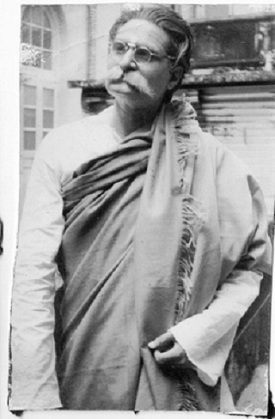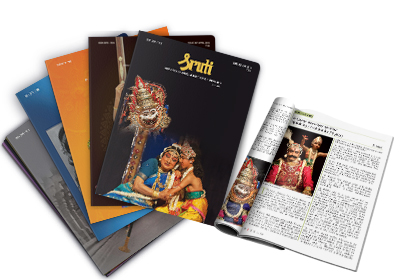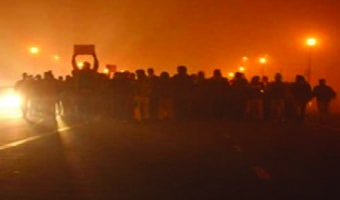
Veteran actor B. M. Vyas passed away in Mumbai on 11 March 2013 at the age of 93. He started his career as a playback singer and then joined Prithviraj Kapoor's Prithvi Theatres in 1944 as a singer and actor. He remained with the company till 1955. He appeared in over 300 films since the 1940s, his last release being 'Oh Darling Yeh Hai India' in 1995. To mark Prithviraj Kapoor's centenary in 2006, Prithvi Theatre, Mumbai created an exhibition around his life and theatre work, involving several of the actors who had worked with him between 1944 and 1960 as part of Prithvi Theatres. During these 16 years, the professional company travelled across India performing their repertoire of original plays. This issue features and extract from a conversation with B. M. Vyas in June 2006 during the research for the exhibition, where the actor recalls several anecdotes from his experiences with Prithviraj Kapoor and Prithvi Theatres. The conversation was with Vikram Iyengar and Tanaji Dasgupta, who researched the material for the exhibition.
Prithvi Theatres started in 1944 and I joined up as a singer. I was already in this field as a playback singer and had sung a few songs for films such as Bhartrihari, Pehle Aap and Vikramaditya. I had worked with people like Mohd. Rafi and Naushad. Now my voice was rather bass and it would be difficult for me to carve a career in the film industry, so I had decided to go back to Rajasthan. Another well-known singer from Rajasthan, Pandit Indra, told me that Prithviraj Kapoor has opened a theatre company and was taking on artists. He gave me a letter of introduction and told me to go and meet him. He was working in the film Nala-Damayanti at that point and shooting was going on in a studio. I went to meet him there with the letter. He was playing Nala, and it was a monsoon scene. He was completely wet, bare-bodied, sitting outside. Someone pointed him out to me and I went up to him and said, Namaskar. With great warmth he invited me to sit down. I said, "Sahab, I have come with this letter." He opened it and said, "But this in Hindi. I can’t read Hindi. In Peshawar, where I come from, women do know Hindi, but not the men. Even the Ramayana and Mahabharata are in Urdu over there. So you read me the letter yourself." So I read it to him. Pandit Indra was known to Prithviraj, and he had written that I was like a brother to him and asked him to give me a job in his theatre. Prithviraj-ji told me that all the artists met at Dhuru Hall in Chabildas Road, Dadar. He gave me directions and asked me to come there at 1 o’clock the next day.
So I went at 1 o’clock but he was late. He finally arrived around 2 o’clock. What a personality he had in those simple clothes. He apologised to me for being late, saying he never left home without doing Namaskar to his father. By that time music director Ram Ganguly, Sajjan, Mohan Saigal, Ramesh Saigal, Mallik Sardar, Uzra Begum, Zohra Begum, Sati Devi – they had already joined the theatre. Assisting Ram Ganguly was Ram Lal who had given music for the film Rajkamal. And there were some tabla and sarangi players apart from some other musicians. He called Ram Ganguly into his office and asked him to take my trial. So we went into the Music Department and he asked me whether I would be able to play the harmonium. I said, yes. At the very beginning, accompanying myself on the harmonium, I sang 'Sapta Surana Teen Pran Gao Sab Gunijan'. He said, "No. Sing a ghazal." Ghazals are not sung in Rajasthan where I am from. I thought, this is the end of my job. I can’t sing ghazals, what shall I do? I saw that Prithviraj-ji was wearing khadi clothes and knew that he was of a nationalist bent of mind, so I decided to sing a patriotic song – one written by my brother Bharat Vyas. So he said, "But I asked you to sing a ghazal." I then told him that ghazals were not sung where I came from. Possibly he wanted to test my Urdu pronunciation. Then he called Ram Ganguly and whispered something in his ear. Ram Ganguly asked me, "You sang a song in Tar Saptak. Can you sing something in Kharaj?" So I offered to sing a Rajasthani song. And Prithviraj-ji was very enthusiastic about hearing it. And while I was singing it, Raj Kapoor – who must have been a couple of years younger to me at that time – came and sat at the tabla to accompany me. He was so carried away by it. In fact, the song created such an atmosphere that Prithviraj-ji said, "This sounds like it could have been from my very own Punjab!" He immediately told Raj to phone his mother and said to her, "Come here as soon as you can. You can hear a great Rajasthani song." I thought to myself, the job is now yours. Prithviraj’s wife, Rama, came and I sang the song again. She enjoyed it very much. Then he called me into his office and said, "Look you are a playback singer and have sung some songs already. As far as this theatre is concerned, I can only now offer some pocket money. Rs. 75 per month is what I can pay. This is what everybody gets. When we start performing plays, I will raise the wages." I said, "I have come here to learn from an artist like you, not for the money." He was very happy and asked me to sign the agreement the next day with his secretary, Ramesh Saigal.
At that point rehearsals for Shakuntala were on and the famous heroine, Swarnalata, was playing the lead role. She fell from the stage during rehearsals and said she would not be able to continue. Her shooting was also keeping her busy. So there was now a problem. Many of the actors had come from the dancer Uday Shankar’s troupe. So Uzra was given the role of Shakuntala. Now who was to play Kanva, Shakuntala’s father? So he called in his friend K. N. Singh. K. N. Singh specialised in the role of villains and Kanva was an old man. However, because Prithviraj-ji had asked him, he agreed. I used to watch rehearsals after our own music rehearsals were over. When Shakuntala found she was pregnant by Dushyant, she could not face her father when he returned to the hermitage. He asks everyone where she is, but all are silent. So he uses a Ved mantra to discover what has happened. K. N. Singh found it very difficult to speak the tough Sanskrit shloka. Even Prithviraj-ji who was Punjabi found it very hard, and he was trying to teach K. N. Singh. I knew the shloka, and on the second or third day of rehearsal he heard me muttering it, turned to me and said, "How do you know this?" I replied that I was a Brahmin, and where I came from we are taught Ved mantras. He said, "Very good! I am Punjabi and even I speak it improperly. So you teach K. N. Singh." And he walked off to his office leaving me on the ground and K. N Singh on the stage. I was scared. I had only seen K. N. Singh in villainous roles. What was I to teach him? I waited for him to speak and then tentatively asked, "Sahib, will you say the lines?" "Not today. Tomorrow." And he went off to Prithviraj-ji’s office and said that such language was beyond him and please find someone else to do the job.
When I came in the next day Ramesh Saigal asked me if I could act in addition to sing. I said I would try if it was needed. What was the role? When he said Kanva, I was very happy because that was the third main role – Dushyant, Shakuntala and Kanva. The others were all minor characters. So I agreed and he put the Urdu script in front of me. I said, "I can’t follow Urdu. Please give it to me in Hindi and I’ll learn it by tomorrow." Because I had classical Sanskrit training, I was able to learn the role overnight. When I came the next day, Prithviraj Kapoor had returned. He asked if I had written the role. I replied I had it by heart and got on stage. There is an emotional scene when Shakuntala is leaving the hermitage to go to Dushyant. Now I had seen Prithviraj-ji in Sikandar and as an old man in Dushman, both in Ganga Talkies, Bikaner. This role reminded me of his interpretation of the old man in Dushman and I played it like that. He was very happy.
When Shakuntala opened, people were very happy. There were huge sets – Papaji had asked a Parsi set maker who made sets for films to do the job. The ashram scene was the first act and that was where Kanva appeared. Now Papaji had not told me to make my hands tremble or anything like that when I played the role. But since I was still very weak, my hands began to tremble during the show. Papaji was watching from the wings. It was Prithviraj Kapoor’s first play – all the major producers and directors were there in the audience. Then it took a long time to change the set and it was very noisy. Papaji’s father Basheshwarnathji – he had big moustaches – started criticising the whole thing saying what kind of a play is this, why have you got such big sets … But Papaji told us, "Do not lose heart. I will give you all bonuses. My play is a success." So we were all very happy. After the play, he came up to me and said, "I never taught you to have your hands and head tremble." So I was scared. I felt I had done something I had not been asked to. So I explained that my hands had begun to shiver and that I had seen several old men who’s heads would shake as they spoke. He said, "I liked it very much. Keep it up." So from then on, I shook both my hands and my head.
Then came Deewar. I did not have much of a role there. I played the leader of the peasants and I had a solo song which used to get a lot of applause. Then there was Pathan where I played the role of Pir Kaka. Then came Ghaddar. For the role of the Maulana, he was going to invite an actor from outside the company. The actors said, now who is going to bell the cat? Who will tell Papaji that we would like an opportunity to play such a good role? So I asked Papaji, "It is such a great character, why do want to invite somebody from outside when there are so many of us here?" So he replied, "Vyasji you speak Hindi well and Sanskrit too. But this is chaste Urdu. It will be very difficult." So I said, "At least try us out." So he asked those who wanted to try to write out the role. So I wrote it, then K. K. Dhawan and Kashinath Gujerati, and Sathyanarayan who was later to become the well-known dance director. And I got the role. Then in Kalakar, there was the Pujari’s role where I had a long argument with Papaji’s character about the evils of urban life.
I have toured all over India with him. Once the train we were travelling in stopped at a station – I think it was Gwalior. And there was this sipahi roaming about the platform checking each compartment. When he came to our compartment, Papaji was at the door – what a personality. He lightly moved the sipahi aside and said, "No you don’t need to check this compartment." The sipahi said, "How can that be? I have to check each one." Papaji repeated, "But not this one." The sipahi said, "Look at the crowd that’s collected to see why I’m not being let in." Papaji smiled and said, "Son, that crowd has not collected to see you. It has collected to see me." The crowd then said to the sipahi, this is Prithviraj Kapoor. So he ran off after a hurried apology.
Once in Indore we were performing in the open. All of us had gone to eat with only Prithviraj-ji, Nand Kapoor, Uzra Begum and some others on stage. A bolt of lightening struck and the makeshift structure came crashing down. We thought, this is the end. We rushed there and found that Prithviraj-ji had collected the others beneath his bulk and a beam had come to rest on his back. He must have been in pain, but he acted as if nothing had happened. Even back at where we were staying where we saw how serious the gash was, he brushed it off.
On tour, Papaji’s father used to accompany us but not his wife, Ramaji. But she used to write to him regularly. The letters used to be in Hindi. So how would he read them? He had one of those Urdu-Hindi, Hindi-Urdu dictionaries and, referring to that, he would decipher the whole thing.
I have acted in a film with him – Raja Harishchandra. Papaji was playing Harishchandra and I was playing Vishwamitra. The director told me that in one of the scenes I had to kick him. I said, "How can I do that? He is my Guru!" The director informed Prithviraj-ji that I was refusing to do this. So Papaji asked me, "Vyas-ji who are you at this point?" I said, "Vishwamitra." "And who am I?" "Harishchandra." "Yes, so neither are you Vyas-ji nor am I Prithviraj, so you can go ahead and kick me as Vishwamitra." I said, "Okay, if you say so." And then he, without informing anyone, had kept some stage blood in his mouth. So as soon as I kicked him, he spat it out and we all thought he was really injured. We shouted, "Cut, Cut!" And he said, "Oh why did you do that. This will ruin the shot." But thankfully the shot had been taken.
At the end of every shoot, he would give every single person on the set one rupee. Including me. I said, "Papaji, you have given me so much already that I have a house to my name now." He said, "Keep this
coin carefully in your purse." I have it with me to this day.
My wife used to tell me, "Why doesn’t he give you any lead roles?" When I conveyed this to him, he said, "Vyas-ji, a hero has a life span of only about 5 years. You will work for much longer." And it’s true. I worked till 1980 when my last film, Razia Sultan, was released.
Vikram Iyengar is a Kathak dancer, choreographer, theatre director and performing arts researcher based in Calcutta. He is co-founder and Artistic Director of the performance company, Ranan.
Tanaji Dasgupta is an actor and producer based in Kolkata. Co-founder of the theatre company Tin Can, he currently works with independent film production house, Overdose.
© Mytheatrecafe



